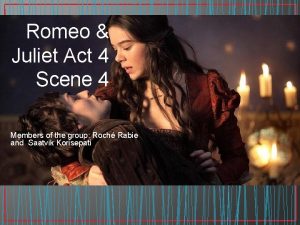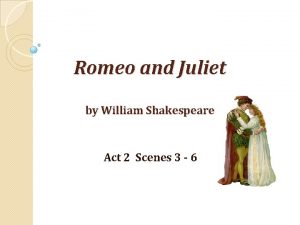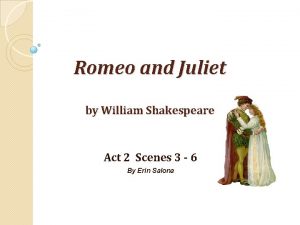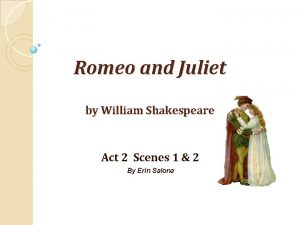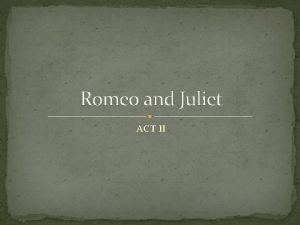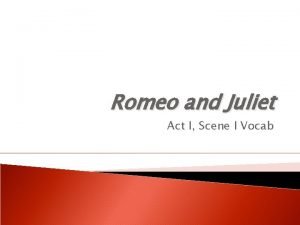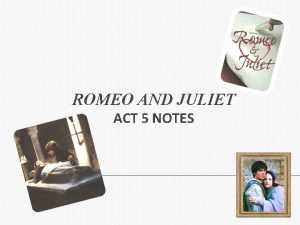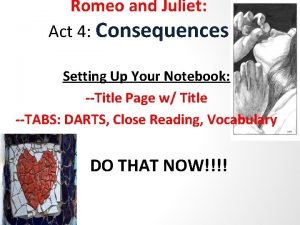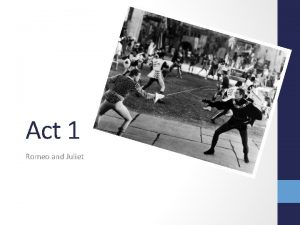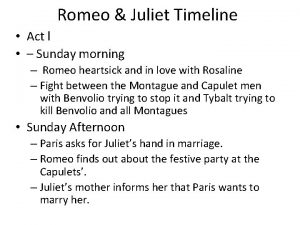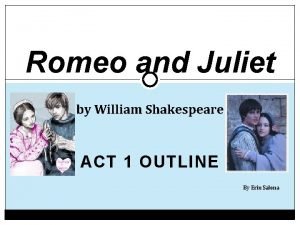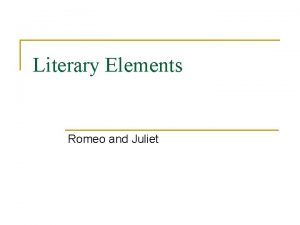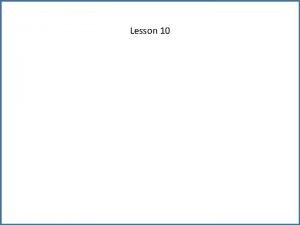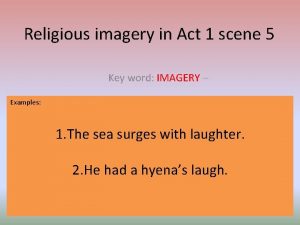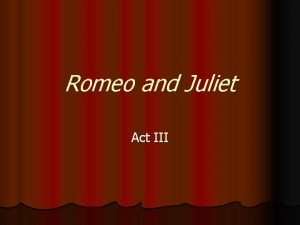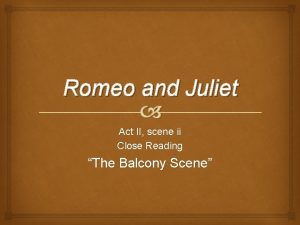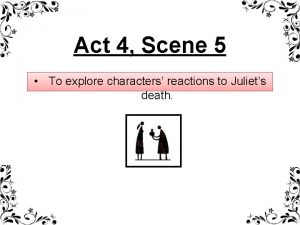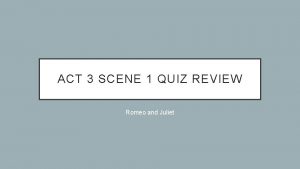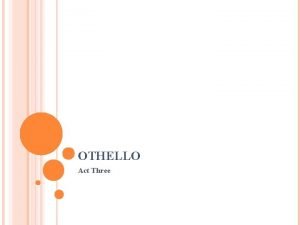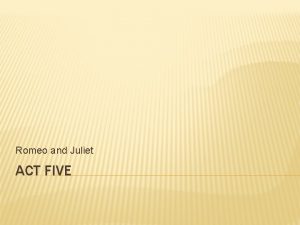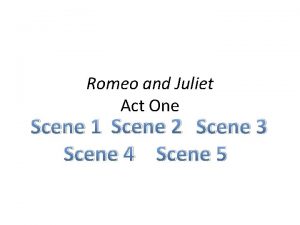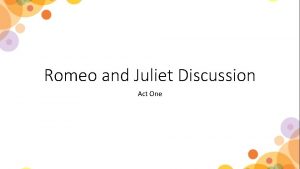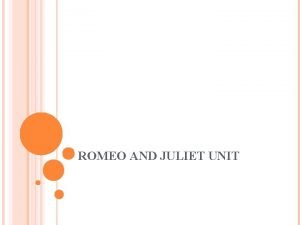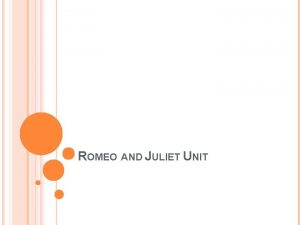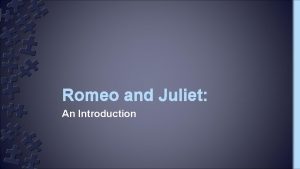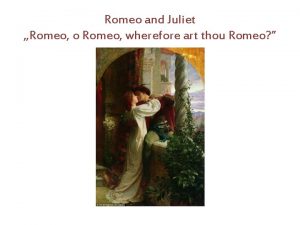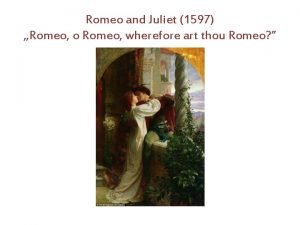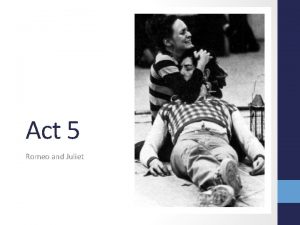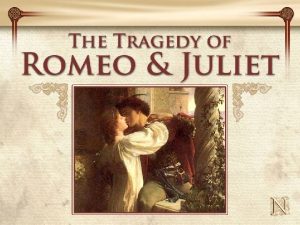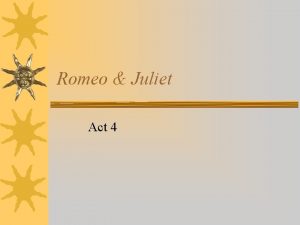Romeo and Juliet Act Three Discussion Scene One







































- Slides: 39

Romeo and Juliet Act Three Discussion

Scene One

Scene One Q: Which character is off stage with Mercutio when he dies? A: Benvolio

Scene One Q: Why doesn’t Lady Capulet believe Benvolio’s story about the events that led to Tybalt’s killing? A: She says that Benvolio is related to Romeo, so he won’t be impartial. She also is doubtful that just Romeo could kill Tybalt. She estimates it would take 20 Montagues to kill a man like Tybalt.

Scene One Q: Why doesn’t the Prince order the execution of Romeo, but instead offers the more- merciful sentence of banishment? A: The Prince was related to Mercutio and so is sympathetic to Romeo’s plight. Also, Romeo took care of issuing justice to Tybalt, which is what the law would’ve had to do anyway.

Scene One Q: At the beginning of Act 3, who says the following lines? What do these lines foreshadow? “I pray thee, good Mercutio, let’s retire. The day is hot, the Capulets abroad, And, if we meet, we shall not ‘scape a brawl, For now, these hot days, is the mad blood stirring. ” A: Benvolio, Romeo’s cool-headed cousin, says these lines. His concern is well-founded, as a few minutes later there will be a street fight that leaves both Mercutio and Tybalt dead.

Scene One Q: What does Mercutio tell us about Benvolio in lines 1527? Is this true? Explain what’s happening here. A: Mercutio says that Benvolio is a hot-head, always looking for a fight. Mercutio jokes that Benvolio will pick fights with men for stupid reasons, such as wanting to fight a man whose cough awakens Benvolio’s napping dog or a man who puts old shoelaces in a pair of new shoes. This, of course, isn’t true. Benvolio is level- headed. We should be chuckling in the audience because we recognize that it’s likely Mercutio himself that he’s describing, not Benvolio. It’s like calling your skinny friend “Tubby. ”

Scene One Q: Examine Mercutio’s “grave man” line. What figure of speech is used? What is the meaning? A: Mercutio uses a pun here, even as he is dying from Tybalt’s stab wound. He says that if anyone asks for him tomorrow, he’ll be a “grave man. ” Two meanings can be drawn here. First, he’ll be somber or sad, much unlike his usual self. The second meaning is closer to the truth. Tomorrow, he’ll be in a grave because he knows that this wound will be fatal.

Scene One Q: Explain the following lines (104 -110): “This gentlemen, the Prince’s near ally, My very friend, hath got his mortal hurt In my behalf – my reputation stained With Tybalt’s slander – Tybalt, that an hour Hath been my cousin. O sweet Juliet, Thy beauty hath made me effeminate And in my temper soft’ned valor’s steel!” A: This is an interesting section because we find out here that Mercutio was related to the Prince. This will be important later in the scene to explain a bit of the mercy the Prince shows toward Romeo. Also, Romeo knows that Mercutio was right; Tybalt was insulting him and ruining his reputation. Then, Romeo realizes that all of this lovey-dovey stuff with Juliet has made him girlish. Romeo feels guilty that he played a part in his best friend’s death, even if that part was unintentional.

Scene One Q: Explain the Prince’s judgment and why he makes this ruling. A: The Prince orders Romeo to be banished from Verona. He was within his rights to order Romeo to be captured and executed, but he gives the moremerciful exile sentence because he was related to Mercutio and says that Romeo killed Tybalt, who would’ve been killed anyway for his role in Mercutio’s slaying. If Romeo is found within the walled city of Verona, however, he will be killed.

Scene Two

Scene Two Q: The Nurse knows where Romeo is hiding. Where is he? A: At Friar Lawrence’s cell/home.

Scene Two Q: At the end of the scene, Juliet gives an item for the Nurse to deliver to Romeo. What is the item? A: A ring.

Scene Two Q: In her speech at the beginning of Scene 2, what is Juliet looking forward to that night? A: Juliet is now a new bride and she’s looking forward to her wedding night love-making. She’s eagerly waiting to lose her virginity to her husband.

Scene Two Q: Give two examples from lines 26 -31 that Juliet uses to explain the agony of expectation that she’s feeling. A: First, she said that waiting for this night is like buying a new house and having to wait before you can move in. Also, she says it’s like having a gorgeous new out t to wear to a special occasion, but having to wait for the party date. Girls in my class usually understand this if I talk about Back-to-School clothes shopping. They have cute new outfits to wear, but have to save them until school starts.

Scene Two Q: Write down three of the oxymorons Juliet uses to describe Romeo and explain why she uses this literary technique to describe her young husband. A: She says he is a “beautiful tyrant, ” a “ end angelical, ” and a “dove-feathered raven. ” She’s convicted as she tries to reconcile the image of her beloved with the same description of the young man who killed her cousin.

Scene Two Q: The Nurse says, “Shame come to Romeo!” How does Juliet react to the Nurse? A: She grows angry with the Nurse because she is criticizing Juliet’s husband. Just three hours ago, Juliet took his name and now she’s standing there while the Nurse slanders Romeo’s name. As Juliet thinks through which side to take (Romeo’s or Tybalt’s), it’s clear that her allegiance will fall with Romeo.

Scene Two Q: Where is Romeo hiding? A: He’s hiding at Friar Laurence’s residence. The Nurse knows this and will go check on him for Juliet.

Scene Two Q: Now that she’s married, Juliet’s looking forward to her wedding night. She uses two analogies to describe her feelings. One involved buying a house and the other involves clothing. Describe one of the two analogies. A: 1. She says the agony of waiting for her husband is like buying a house but not being allowed to move in right away. 2. It’s also like buying a beautiful outfit for a festival and not being allowed to wear the new clothes until the day of the party (back-to-school clothes shopping? ).

Scene Three

Scene Three Q: Romeo is upset that he’ll no longer be able to see Juliet, but this living creature will be able to see her, be near her, even feel her breath/steal a kiss. What is the living creature that Romeo envies? A: Flies

Scene Three Q: The Friar tries to comfort Romeo by listing all of the things he should be thankful for. His refrain in this passage is repeated several times as he reminds Romeo that banishment is a merciful sentence and many things are going right for the young man. Fill in the blank from this line repeatedly used by the Friar: “There art thou _____. ” A: Happy

Scene Three Q: After he spends tonight with Juliet, what town will Romeo go stay in until the Friar can smooth everything over? A: Mantua

Scene Three Q: What is Friar Laurence’s opinion of Romeo’s punishment in Scene 3, lines 25 -28? A: It’s a merciful sentence because the Prince could have ordered Romeo to be executed. He thinks Romeo is lucky.

Scene Three Q: In Scene 3, lines 33 -39, why does Romeo say that he is less honored than carrion- flies? A: He’s upset that flies can buzz around Juliet’s head and touch her lips, but he may not.

Scene Three Q: What three reasons does Friar Laurence give Romeo to show that he should be happy? A: Romeo should be happy that Tybalt didn’t kill him in the fight. He should be happy that Juliet is alive and still loves him, wants to be with him. He should also be happy that the Prince was merciful and gave a lighter sentence than the law would usually require.

Scene Three Q: In Scene 3, the Nurse gives Romeo a gift from Juliet. What is the gift? A: She gives him a ring that Juliet wanted him to have.

Scenes Four & Five

Scenes Four & Five Q: At the beginning of the Scene 4, it is late Monday night. Lord Capulet decides that a wedding would lift everyone’s spirits. On what upcoming day does Capulet decide Juliet will marry Paris? A: Thursday

Scenes Four & Five Q: As dawn breaks, Juliet doesn’t want Romeo to leave her bedroom. She says the light outside isn’t the sun. What, does she say, is causing the light? A: A meteor

Scenes Four & Five Q: After Juliet’s father threatens to disown her if she doesn’t marry Paris, Juliet seeks help from her mother. What is Lady Capulet’s response when Juliet says she’ll kill herself before she’ll marry Paris? A: Do what you will. I’m done with you. So cold!

Scenes Four & Five Q: Capulet explains to Paris that Juliet is upstairs crying about Tybalt. He says, “Look you, she loved her kinsman Tybalt dearly, And so did I. Well, we were born to die. ” From this passage, explain how Capulet felt about his nephew. Why, do you suppose, he felt this way? A: It’s an odd way to describe the death of a relative, as it seems Lord Capulet isn’t too upset about his nephew’s death. Remind students that back in 1. 5 Tybalt was scolded by Capulet for not obeying his command. It’s clear from this brief bit of text that Tybalt wasn’t Capulet’s favorite person in the world.

Scenes Four & Five Q: What decision does Capulet make, thinking that it will cheer up Juliet? A: He decides that she will marry Paris, after all. A wedding, Lord Capulet figures, will bring some joy to the household and ease Juliet’s grief because Paris is such a prized bachelor to snag.

Scenes Four & Five Q: What is Paris’ reply when Capulet makes his announcement? A: Awesome! He says he wishes the wedding date were tomorrow because he’s so ready to be with Juliet.

Scenes Four & Five Q: Why does Juliet want to believe the songbird she can hear is a nightingale, not a lark? A: She wants the night to last so that she can continue to be with her husband. The morning lark, however, is the true source of the music, so Romeo must leave if he wants to live.

Scenes Four & Five Q: What does Juliet mean by an “ill-divining soul” in Scene 5, line 54? A: She says her soul is predicting evil things. The rest of that passage foreshadows Romeo’s early death. It bothers Juliet that this is the last image that ashes in her mind as she says goodbye to Romeo.

Scenes Four & Five Q: Why do Juliet’s parents believe she is upset? What is their plan to help cheer her? A: They still think she’s grieving over Tybalt’s death. They inform her that Paris will be her husband she should thank them for hooking such a great spouse for her.

Scenes Four & Five Q: Earlier in the play, Capulet said Juliet will get to have a voice in whom she marries. Now, he’s raging at his daughter for speaking up against his choice. Explain why Capulet has changed his mind about listening to his daughter’s opinion about her future spouse. A: First, he’s shocked angry that Juliet is having such an adverse reaction to his news. He had expected joy and gratitude. Next, he would be humiliated if he had to explain to Paris that he doesn’t have control over his household. Remember, in this time, the man ruled the household and a father had all of the power to decide whom his daughter would marry. It would be a disgrace to him to have a de ant daughter. Finally, we already established in 1. 5 that Capulet has a hot and swift temper when we saw Tybalt question his opinion. There are echoes of that rage here, as he threatens to disown Juliet if she doesn’t obey him.

Scenes Four & Five Q: How does the Nurse describe Paris in Scene 5, lines 218 -223? A: She tries to comfort Juliet by saying that Romeo’s as good as dead to her, since they can’t live in the same town; she should try her best to forget him. Paris, however, is a wonderful man. He’s “lovely, ” meaning goodlooking and polite, and he has green eyes that are attractive and sharp. Romeo’s like a soiled dishrag when compared to Paris.
 Act 4 scene 2 summary romeo and juliet
Act 4 scene 2 summary romeo and juliet Romeo and juliet scripts
Romeo and juliet scripts Romeo and juliet act 4 scene 1 quotes
Romeo and juliet act 4 scene 1 quotes Romeo and juliet act 3 scene 5 script
Romeo and juliet act 3 scene 5 script Romeo and juliet act 2 scene 6 summary
Romeo and juliet act 2 scene 6 summary Romeo and juliet act 2 scene 3 summary
Romeo and juliet act 2 scene 3 summary Romeo and juliet script act 2
Romeo and juliet script act 2 How does juliet please capulet in this scene
How does juliet please capulet in this scene Metaphors in romeo and juliet act 2
Metaphors in romeo and juliet act 2 Valiant romeo and juliet
Valiant romeo and juliet How did paris die in romeo and juliet
How did paris die in romeo and juliet Romeo and juliet act 4 summary
Romeo and juliet act 4 summary Romeo and juliet act 3 scene 5 summary
Romeo and juliet act 3 scene 5 summary Prologue romeo and juliet
Prologue romeo and juliet Personification romeo and juliet act 3 scene 5
Personification romeo and juliet act 3 scene 5 Important quotes from romeo and juliet act 1 scene 5
Important quotes from romeo and juliet act 1 scene 5 Macbeth summary act 5 scene 1
Macbeth summary act 5 scene 1 Romeo and juliet act 3 themes
Romeo and juliet act 3 themes Summary of act 2 scene 4 romeo and juliet
Summary of act 2 scene 4 romeo and juliet Paris asks lord capulet for permission to
Paris asks lord capulet for permission to Romeo and juliet pilgrim metaphor
Romeo and juliet pilgrim metaphor Romeo and juliet sunday
Romeo and juliet sunday Why does benvolio want to crash the party
Why does benvolio want to crash the party Romeo and juliet repetition
Romeo and juliet repetition Macbeth hubris
Macbeth hubris Symbolism in romeo and juliet act 1 scene 5
Symbolism in romeo and juliet act 1 scene 5 Romeo and juliet act 3 scene 1 summary
Romeo and juliet act 3 scene 1 summary Romeo and juliet act iii scene i
Romeo and juliet act iii scene i Romeo and juliet balcony script
Romeo and juliet balcony script Act ii scene ii romeo and juliet
Act ii scene ii romeo and juliet Romeo and juliet act 2 script
Romeo and juliet act 2 script How do the characters react to juliet's death
How do the characters react to juliet's death Romeo and juliet quiz act 3
Romeo and juliet quiz act 3 Romeo and juliet test act 1
Romeo and juliet test act 1 Othello act three scene three
Othello act three scene three Othello act one scene one summary
Othello act one scene one summary Othello act 1 scene 1 short summary
Othello act 1 scene 1 short summary In what year is act one, scene one set?
In what year is act one, scene one set? Othello act one scene one annotations
Othello act one scene one annotations Romeo and juliet diorama
Romeo and juliet diorama
